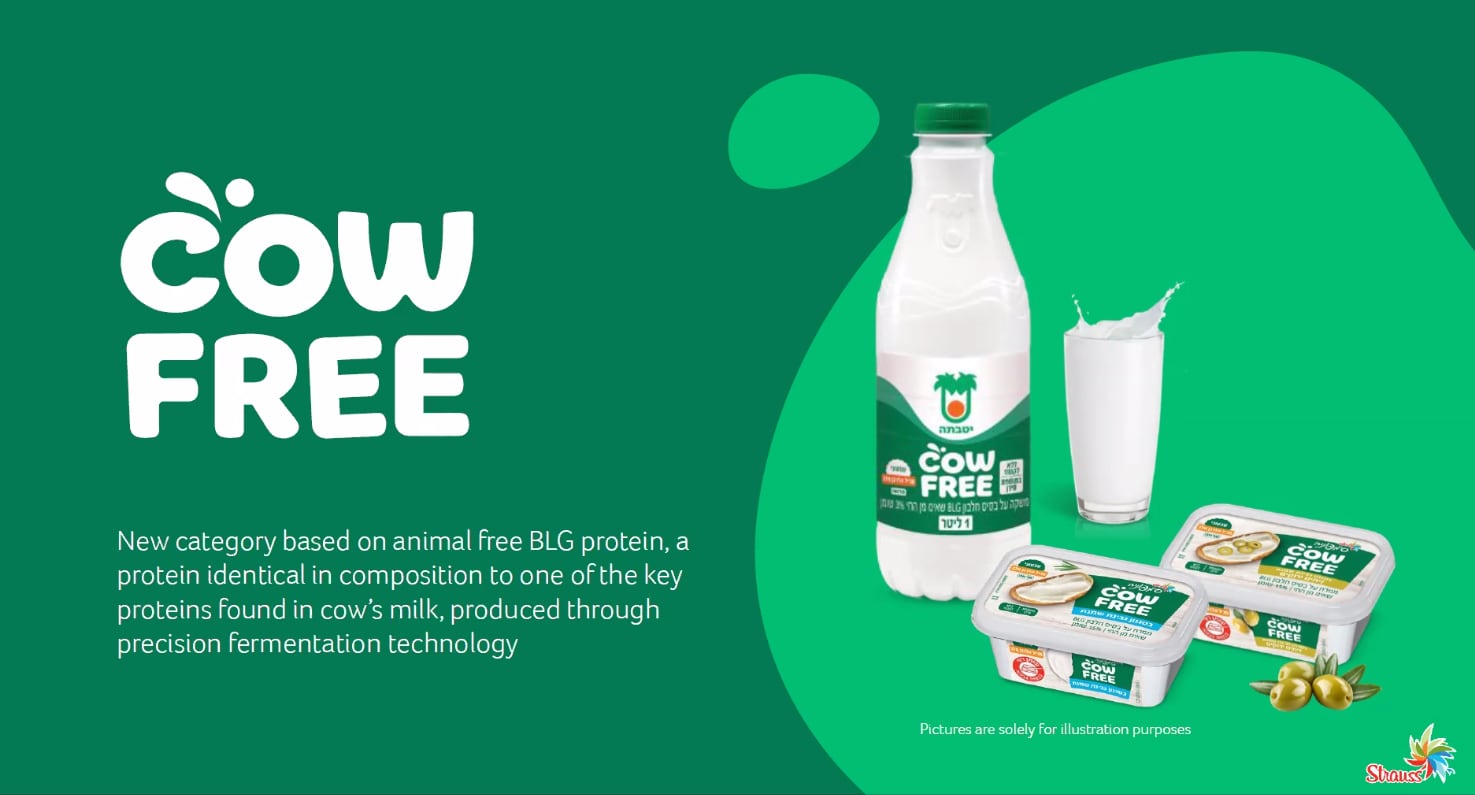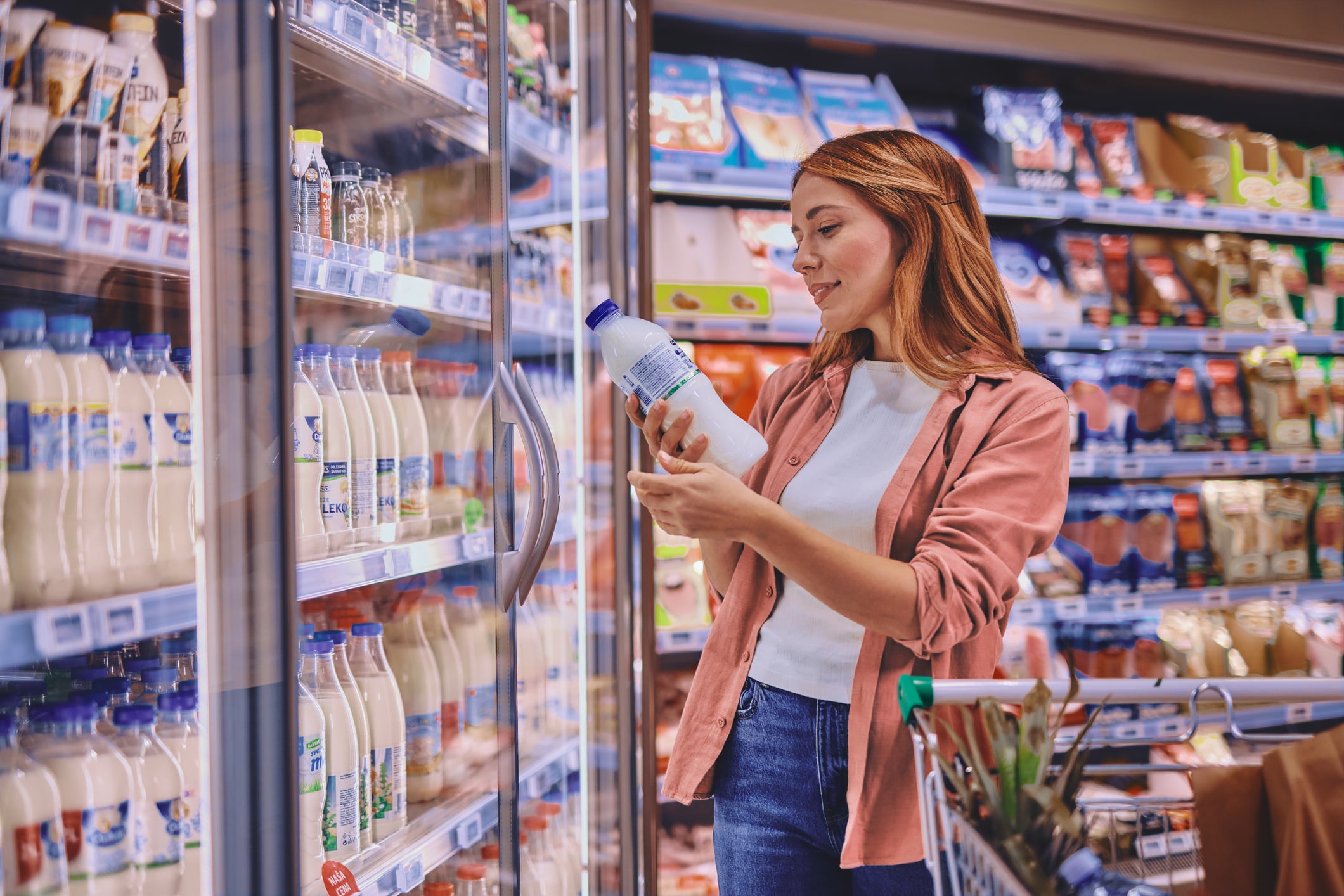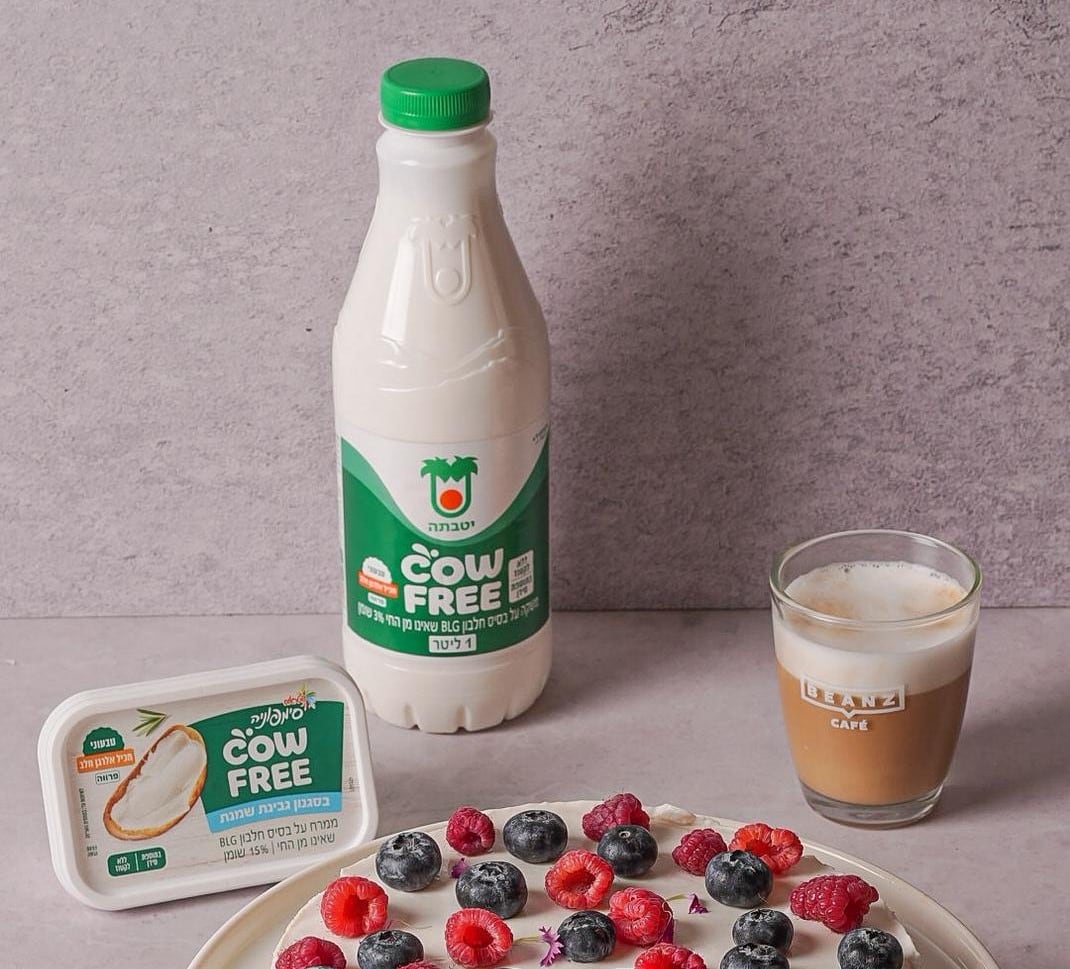Food and beverage major Strauss Group said its animal-free dairy range Cow Free is performing in line with expectations following its launch in Israel in September.
All product that’s been put on the market has sold, group CEO Shai Babad told investors this week, but warned it was too early to draw conclusions regarding demand given the range’s limited production run so far.
Made in partnership with foodtech company ImaginDairy, Cow Free comprises a beverage and a spread made with precision fermentation-derived dairy protein, Beta-lactoglobulin (BLG). This means the products have the same taste, texture and functionality as traditional dairy and contain many of the nutritional properties of the real thing but remain kosher and suitable for vegans. The animal-free versions are also more climate-friendly due to requiring fewer resources to produce.
Strauss Group’s Cow Free line is the first consumer range of animal-free dairy products to launch in Israel. The retail pilot has been closely-watched by manufacturers and start-ups globally as a means to provide consumer and market insights into a category that’s often perceived as ‘the best of both worlds’ in the alt dairy segment.

During the company’s third quarter earnings call, Babad explained that Cow Free uses ‘the same BLG protein’ as traditional dairy but ‘it comes from either mushroom or yeast’.
“From that, we managed after two and a half years of development to develop these products, and the advantages are that they are very similar in the taste to cheese and milk.
“They have the same protein and the same health components, but they don’t have lactose, so anyone who is sensitive to lactose will not have a problem having those products. And also, they don’t have cholesterol because they don’t come from animals. We think there’s a place for them in the market and demand from consumers for these type of products.”
But he warned the category is still ‘very, very small’ for the group to draw substantial conclusions regarding demand.
“Right now, there’s not even a point in talking about revenues or demand. We’ll need a couple more quarters before we actually have some data and really understand [the market],” he said.
“We know that everything we put on the market has sold, but it’s very small quantities still under test.”
Shai Babad, Strauss Group CEO
“There’s also educating consumers what this new category is: what do you mean it’s milk but it’s not milk? What do you mean it doesn’t come from a cow? It’s something that really needs to be explained and really needs to be experienced by the consumers, so we think it will take time but this category will grow nevertheless.”
CFO Tobi Fischbein added that the range is performing “very much” in line with expectations regarding sales so far and “even more so” when it comes to “the sensory test, the consumers reaction to what we’ve done”.
“But I want to be very careful: there’s still very limited amount of products that we put on sale and it’s still very early,” the CFO said. “I think that by the end of next year, we will be able maybe to scale a little bit up our production abilities and get more protein and put more products on the market.”
Protein availability ‘very limited’
Strauss Group CEO Shai Babad also questioned the availability of precision fermentation-derived proteins, highlighting one of the biggest hurdles for start-ups in the category: producing enough of the stuff to make commercially-viable and price-competitive cow-free products.
“There’s a questions of the availability of those proteins: how available they are going to be,” he said. “Once this becomes more scalable, then there’ll probably be more factories that will produce this or be easier to make this at scale.
“Right now, our ability to get these products to market is very, very limited because the input product, the protein, is produced in very limited amounts.”
What's 'cow-free' dairy?
Animal-free (or 'cow-free') dairy is an emerging category within the dairy alternatives sector, where microorganisms such as yeasts are genetically programmed to produce proteins like caseins, whey and lactoferrin. Because these ingredients are genetically-equivallent to traditional dairy proteins, they can be used to make alt dairy products with identical taste, texture and functionality to animal-derived dairy, and thus superior to most plant-based alternatives.
But market and regulatory hurdles exist. Precision fermentation-derived food and beverage products are available in very few markets - the US, Singapore, Israel and South Africa, with foodtech companies yet to achieve regulatory approval in Europe, where EFSA's novel foods application process remains complicated to navigate. Investment sentiment has also cooled off in the past year, putting additional strain on start-up companies in the field.
Consumer perceptions of this emerging category also vary while products are typically sold at a premium to traditional dairy, creating market challenges. Unilever-owned Breyers' Ice Cream released a cow-free ice cream, then discontinued it; and General Mills' Bold Cultr alt cheese brand was scrapped shortly before its e-commerce launch. Other products, such as Tomorrow Farms' range of animal-free dairy Bored Cow and Perfect Day's Brave Robot ice cream, are no more. In fact, Circana told us the US category is in a lull: with sales still very low and brands struggling to stay in the market.
This challenging market and regulatory environment has prompted foodtech companies to reconsider their business models from manufacturing ingredients and consumer-ready products, to focusing on B2B ingredient partnerships with manufacturers, who can shoulder the task of formulating and distributing food and beverage products.
Strauss Group’s partner ImaginDairy owns and operates industrial-scale precision fermentation production lines focused on dairy ingredients. The facility was acquired in early 2024 and enabled the company to offer animal-free products at cost parity to traditional dairy.
The factory has more than 100,000 liters of fermentation capacity and the start-up plans to triple this volume by 2027.
Dr. Eyal Afergan, CEO and co-founder of ImaginDairy, said the company is ‘in active discussions’ to expand production.
“We’re extremely proud to have reached this moment, and to already be in the market with a commercial product alongside our partner,” he told us. “For us, it’s a powerful validation that cow-free dairy is no longer theoretical: it’s real, it’s on shelves, and consumers are responding.
“Imagindairy was the first company globally to operate its own dedicated precision-fermentation facility for dairy proteins. Having full control over an industrial-scale fermentation line with over 100 cubic meters of total capacity has given us a significant strategic edge and has allowed us to reach commercial readiness earlier than most in the field.
“At the same time, we completely agree that today’s category is still in its early stages and is limited by quantities.
“To unlock the full potential of cow-free dairy, larger-scale production is essential, which is why we’re already in active discussions with partners to expand into additional facilities and bring significantly more volume to the market.
“The foundation is in place, and we’re committed to scaling responsibly and rapidly to meet the category’s growing demand.”
Three categories to shape the future of dairy
Strauss’ chief executive reflected on the broader dairy sector, stating that three categories at the heart of the dairy industry going forward – traditional milk, alt milks such as soy, almond and oat, and cow-free dairy – but building up the latter will likely take time.
“It took more than 10 years to grow the alternative milk category here in Israel and today, it’s still growing,” Babad said.
“But we do believe cow-free can grow to be a very big category in Israel, to be a solution not just in milk drinks and spreads but also in yogurts and desserts and in any dairy product that we have today.”


